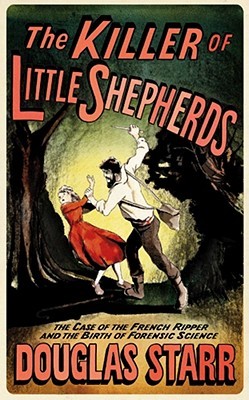So lately, I've been in a bit of reading slump. One of my seminars has monthly book reports (multiple books), and reading three Japanese books in three days basically killed all my drive I had to read. Really. All I was reading, for a time, were comics (thankfully, there's Scribd). It wasn't until I picked up this book that the reading slump was broken, and I managed to finish the book (in about two days, so I'm closer to form).
This book has two components: One follows the case of Joseph Vacher, a serial killer akin to Jack the Ripper (I believe he's called the French Ripper). The other follows Dr. Alexandre Lacassagne and his colleagues, detailing how the created the field known as forensic science. The two characters don't actually meet until near the end of the book, but their stories are told simultaneously. So you have alternating chapters, one about a criminal, and one about a crime-fighter. It could have been jarring, but I didn't really mind. In fact, the author managed to link the two stories by showing how the new methods were or were not used.
Towards the end of the book, it moves away from the story of forensics into the story of the insanity plea. Vacher tried to convince the court that he was insane at the time of the murders, and Dr. Lacassagne tried to do the opposite. Personally, I don't believe Vacher was insane. I think he was a person who, after being jilted and without a job, gave in to the voice of evil and started killing. I don't think he was insane in the sense that he did not know he was committing a crime and thus not legally responsible.
Another aspect of the book I thought interesting was when it explored the lives of those who were falsely accused of being killers. We might think that the internet age is the age that never forgets, but that's not true. Many of the people falsely accused had their reputations ruined for good, and they had to move away for face mob justice. Even the sentencing of Vacher didn't change things, and the families of some victims insisted that this other guy was the real killer.
This is contradictory, but I thought the book was both morbid and hopeful. It's morbid because, hey, it's a story about a serial killer who struck at random and killed many innocents. How much sunshine and rainbows can you put into a story like that? But, it's hopeful because it showed the birth of forensic science, and that there are people in this world who will fight against the monsters.
Monday, May 25, 2015
Subscribe to:
Post Comments
(
Atom
)


No comments :
Post a Comment
I really do appreciate all comments, and I'll try my best to reply within 24 hours!
^_^